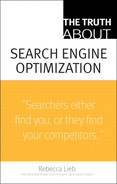Every website, whether personal, business, informational, a blog, or even an online store, publishes information. By default, that makes every website owner and operator a publisher, whether they think of themselves that way.
To optimize a site for organic search, you’d do well to think of yourself as a publisher—starting now. You might as well, because if you have a website, you’re publishing information about something: your business, your products and services, your passion for fly-fishing, favorite recipes, something. Unless you’re interested in sharing that information with the Internet community at large rather than just family and friends, you ought to be thinking strategically about your website’s content.
Good, strong, relevant content—and above all, good writing—is a powerful differentiator, and one that over time tends to be rewarded with higher placement in search engine rankings.
So what is good content?
• Good content is well-written. It contains few (better yet, no) spelling or grammar mistakes.
• Much like a newspaper or magazine, it is updated frequently and presented in short, easy to digest paragraphs rather than in long, rambling blocks of text.
• The keywords or phrases searchers use to find you should be included in the writing, ideally higher up on the page. If a website’s purpose is to sell beekeeping supplies, terms such as “beekeeping,” “bees,” and perhaps “honey,” “honeycomb,” “net,” and “hive” belong in the information on that site’s pages. (A discussion of how to research keywords and phrases is included in Truth 12, “Keywords are key.”)
Develop a plan for updating content on a regular basis. Daily would be great, but weekly or monthly work well, too. Develop content with a narrow, targeted focus. The purpose of website content is to educate, inform, and enlighten visitors, as well as to provide search engine crawlers with a clear and focused notion of what it is your site is trying to sell or to accomplish. If you can’t write, it’s worthwhile to consider paying someone who can.
Bear in mind that all-important search optimization adage: “In the beginning, there was the word”. Above all else, search engines are concerned with one thing: text. The words on each page of a site are what the search engine matches to queries. The closer the match, the greater likelihood there is of that page being relevant to a search query.
There are creative ways to bring relevant content into a website that don’t burden the site owner with the onus of writing it all from scratch. Customer reviews are one such example. A recent study by PowerReviews and The E-tailing Group reports nearly 9 out of 10 U.S. buyers read customer reviews at least “some of the time” before buying.
Additional content examples might include company press releases (you do post these on your website, don’t you?), white papers, news articles (used with permission), case studies, how-to’s and user tips for products and services, and research reports.
This type of content affords benefits that go beyond supplying search engines with relevant text and copy. Strong content induces repeat visits to a site, and just as importantly, provides reasons for external sites to link to your own. Links, as we’ve seen, make it easier for crawlers to find your site and (as we’ll examine in Truth 20, “Some links are more equal than others”) are a major criterion used by search engines when determining how high a site will rank in organic search results.
Retailers and service providers are advised to consider all aspects of the sales cycle when developing content strategies. Let’s use plastic surgery, a high-consideration purchase with a fairly long and educational sales cycle, as an example. The American Society of Plastic Surgeons gets it right. The first line of copy of the relevant page reads, “Also known as rhinoplasty, nose surgery...”. Right off the bat, they’re paying attention to the keywords a searcher might use to find the page (rhinoplasty and nose surgery). The page goes on to outline initial considerations, the different types of surgery, finding a physician, what to expect in the consultation, costs, what to expect from surgery, recovery, long-term results, prescriptions, health tests, a list of “words to know,” and more. This one page covers the waterfront in terms of the entire rhinoplasty sales cycle, and addresses every possible question a prospective patient (buyer) might have. Small wonder the page resides as the #1 search result for a term that’s not even included in any copy on the page: “nose job”. That’s the SEO reward for clear, informative, and educational content.
This is also where thinking like a publisher comes in. Most businesspeople are too close to their products or services to break them down into these small bite-sized nuggets of information. Plastic surgery might be a high-consideration purchase, but search is used as a research tool for all kinds of transactions. If you sell something utterly utilitarian and straightforward, such as nails, don’t despair. Get to thinking. Create informative, compelling content describing the different types of nails: What nails are used for what jobs? Which nails are better for construction, and which are better for crafts? Describe the difference between stainless steel, galvanized, and copper nails. Explain why the length and type of head matter. Create a how-to section on choosing the right nail for the job.
There’s probably more, but I don’t know the first thing about nails—but I do know the type of questions that I might be asking if I were planning to buy nails for a project. If you sell nails, you know what questions your own customers ask before buying. A good content strategy begins by tackling those questions head on.
